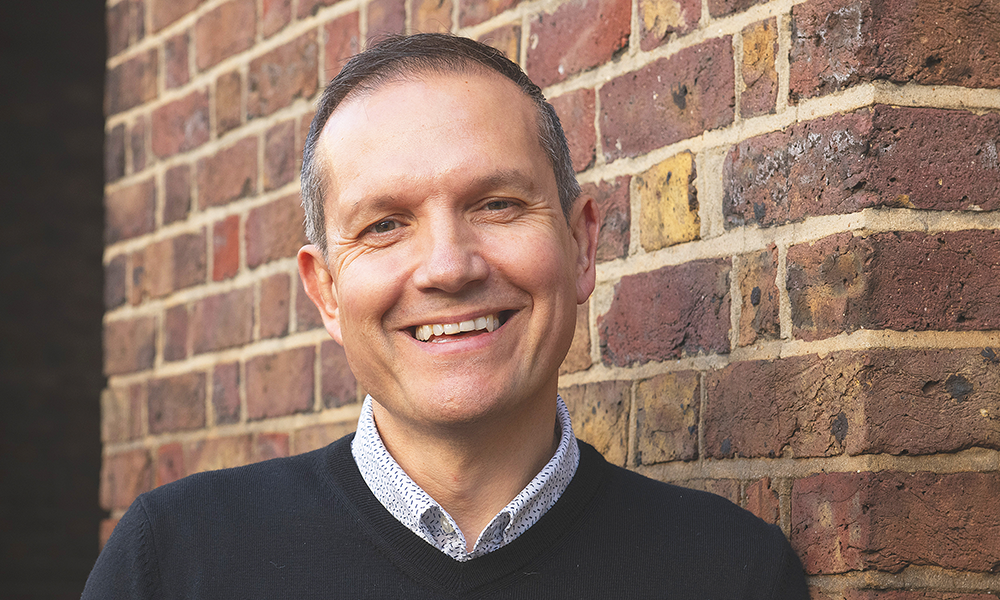Founder and CEO of the Cannon Workshops-based company, Chris Ezekiel, talks global growth

Subscribe to Wharf Life’s weekly newsletter here
All in all, 2023 is shaping up to be a big year for Chris Ezekiel and Creative Virtual – the company he founded on the Isle Of Dogs in November 2003. In 12 months time, he and his colleagues will be celebrating its 20th birthday.
But before that happens, there’s the small matter of becoming a father for the second time and – business-wise – the firm is set for a major release of its V-Person software, named Gluon.
The software is the platform that has allowed Creative Virtual to grow into a global concern, from its base next to Canary Wharf at Cannon Workshops.
From there, housed in the honey brick of the Grade II listed former cooperage beside West India Quay, Chris and his team compete with the likes of Microsoft, IBM and Google in the field of conversational artificial intelligence (AI).
Together, they have built a business with global reach, servicing clients across the world including the likes of HSBC and Lloyds Banking Group – one of the firm’s first clients and still a customer today.
In 2022, Creative Virtual has operations in the UK, the US, Europe, Australia, Singapore and in India. It’s a Docklands business trading with the world.
“We’re still independent, which is a bit unusual for a tech company in the fast-paced world of AI,” said Chris.
“I always started it for the long-term, and over the years we’ve had quite a few offers to purchase the company, which I continue to refuse.
“I’m just enjoying it and we’re competing in that area we’re operating in – conversational AI is all the rage now.
“For me, it’s about working with incredible people who are passionate about innovation, creativity and technology – some things are more important than money.
“We don’t have investors so what we do isn’t linked to their short term goals.
“While Elon Musk has recently bought Twitter, I reflected the other day that he could not buy Creative Virtual. It’s great to have that independence.”
The company’s position comes through its success developing and implementing chatbots for clients.
These might be used by a firm’s customers, employees or its customer services personnel as a resource to assist clients.

With almost 20 years in business and numerous accolades – among them a Queen’s Award For Enterprise in 2017 – Chris said the company continued to prioritise innovation, investing its profits to grow.
“It was always the dream to become a global company,” he said. “But you don’t often get a chance to step back and consider what you’ve built.
“We pride ourselves on having a really quirky, passionate team – a really eclectic mix of individuals. It also allows us to be adaptable and to work in markets all around the world.
“Travelling to these different locations really brings it home and having the fantastic customers we do really helps.
“Being able to explore creativity and innovation with those companies and partners has been amazing over the years. It’s what keeps us going.”
That ongoing drive has resulted in Gluon, which Chris said would be the foundation of Creative Virtual’s work for many years to come.
It’s aptly named after an elementary particle that holds quarks together to form subatomic particles such as protons and neutrons – the basis for atoms and ultimately everything in the universe.
It’s also a reflection of the Creative Virtual founder and CEO’s love of physics.
“I have a picture of Richard Feynman above my desk with his quote that you should not fool yourself and that you’re also the easiest person to fool,” said Chris.
“That’s something I always focus on because it’s really important to keep things in perspective, to keep them real.
“With Gluon we’re very excited because, while we do small software releases every month or so and major ones roughly every 12 months, this is the kind that only comes along once every four years.”
Gluon as software bears some similarities to gluon particles in that they both connect elements to create something of greater complexity and function.

“First of all, the new software allows us to integrate our system with lots of other systems at a large enterprise,” said Chris.
“That might include CRM systems and data management systems, for example.
“There’s a lot of buzz around AI and we’ve seen chatbots that use machine learning as a black box without any control over the responses the system is giving.
“We’ve always taken a different path, combining AI with humans overseeing the system, and Gluon will make that easier.
“The way we’re combining those two elements is unique in the industry and Gluon makes it super easy for organisations to use.
“The way it’s configured and the reports that come out of it make it really efficient and also controllable.
“There’s also a lot of interest in something called the ‘Composable Enterprise’ which is all about plugging systems together.
“Gluon fits perfectly into that to become a key piece of the jigsaw.
“We intend to launch in the early part of next year. We already have a test version available and have done 50 demonstrations so far.
“The feedback has been incredible. We sell direct to customers, but we also work through some partners in the world and everybody’s been unanimous in their positive responses.
“It’s a great way to develop, because the feedback is very specific.
“Taking our time is very important, because we’ve been able to listen to what people are saying while we are developing the software.
“We can be more flexible with our customers because we don’t have pressure from investors.
“It’s funny for me on a personal level, because people wondered whether having a 16-month-old now and another on the way in February would change my view about the company and whether it would be time to sell – but it hasn’t one little bit.
“I am often asked how difficult it is to separate the business from my personal life, but my view is that you should give up doing that because it stresses you out.
“If you’re an entrepreneur, you’ve got to build it into your life – it is your life and you have to find a way to do that.
“Having a supportive group of people around you, both inside work and outside, and having some hobbies and interests is essential. I snowboard and watch West Ham to relax.
“But at the end of the day business is business, you shouldn’t take it too seriously.
“That might sound odd from someone who has to pay all the bills and make sure the people who work for me can pay their bills – but knowing there are more important things in the world keeps me level-headed.
“It’s a balance and as long as you can say overall you’re happy with that balance, then you’re in a good place.
“That’s why I can’t imagine retiring.”
Read more: Discover the 2022 Greenwich Theatre panto
Read Wharf Life’s e-edition here
Subscribe to Wharf Life’s weekly newsletter here
- Jon Massey is co-founder and editorial director of Wharf Life and writes about a wide range of subjects in Canary Wharf, Docklands and east London - contact via jon.massey@wharf-life.com



